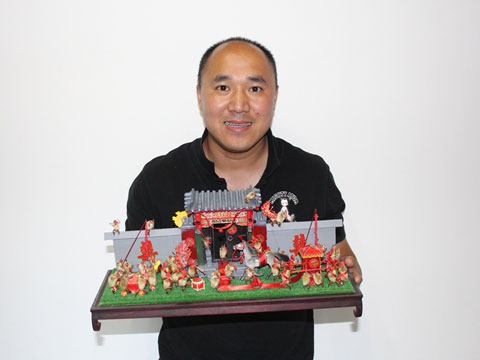
Xiao Jing Photo: Billie Feng
In his studio in Beijing Bai-gong-fang (京城百工坊), Xiao Jing (萧静) is working hard to create about 300 “hairy monkeys” (毛猴), or “monkey dolls”, for the next exhibition that is coming soon. In fact, the hairy monkey name is misleading as it has nothing to do with the monkey. It is a traditional handicraft of old Beijing. It refers to a small figurine whose head and limps are made up of cicada sloughs and whose body is of a magnolia bud with yellow cilia.
According to Xiao, the hairy monkey was accidentally created by an apprentice in a Chinese medicine store during Emperor Tongzhi’s reign (1856–75) of the Qing Dynasty. The apprentice was once scolded by the accountant of the store. When he fiddled with medicinal materials that night, he used the materials to make a small figurine and showed it to his friends and made fun of the accountant. That was the first hairy monkey in the world. After generations of refinement and improvement, the skill of making the hairy monkey has been passed down and become a lovable handicraft favored by people from home and abroad. It has been listed as an intangible cultural heritage at municipal level.
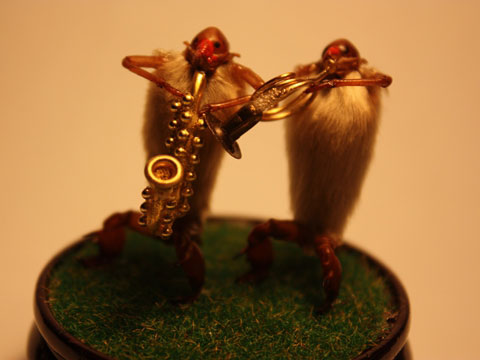
Two hairy monkeys playing musical instruments Photo: courtesy of Xiao Jing
A young man of the post-80s generation, Xiao has been making hairy monkeys for only about six years. He learned the skill from his father. His father has been registered as an inheritor of the handicraft. At present, Xiao can only make small- and medium-sized products. He still needs help from his father when working on large-sized projects. “I think there is still a long way to go before I can become a registered inheritor of this traditional handicraft,” he smiled.
As is known to all, a handicraft artisan needs to be patient at work. “My father told me that the first thing I needed to learn was to sit still and focus my mind all day,” Xiao said. He admitted that he hesitated about whether he should devote himself to the making of the hairy monkey for the rest of his life before he made up his mind to start all this. “I wasn’t a quiet person. I liked to play and hang out with friends. I even thought about giving up after I had started doing it, but my father encouraged me to persevere,” he said.
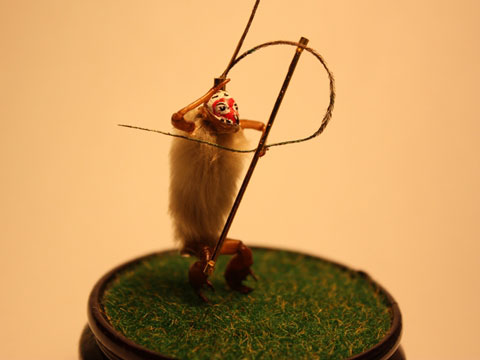
Qi Tian Da Sheng (齐天大圣) Photo: courtesy of Xiao Jing
Xiao said the making of a hairy monkey itself is simple, which seems monotonous and boring, but new ideas have to be constantly applied if the tradition is to survive. He pointed to a glass box which showed a scene of some hairy monkeys competing in a basketball match. “This was created by my father around 1980. The theme was quite new at that time,” he said, “The hairy monkey is a Beijing handicraft, but the themes can come from all over the world.”
When a new idea occurs, imagining the scene and props are also important parts of the creation process. “You need to make musical instruments for a jazz band; you need to make a sedan for a traditional Chinese wedding; and you need to make various weapons for a battle scene,” Xiao said. He pointed out that the artisan should have an extensive knowledge about everything. “You should always know what is needed for a particular scene. When a customer wants you to create a Beijing Opera scene, you should know how to do the face painting,” he said, “Sometimes it takes more time to do the scene than make the hairy monkeys in it.”
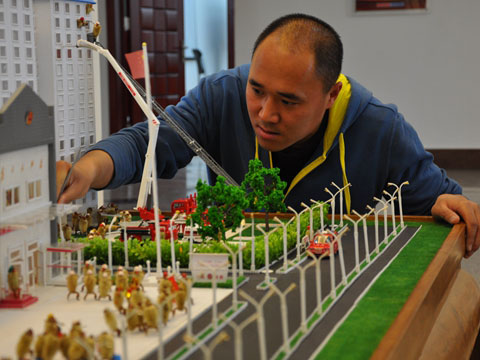
Xiao works on a large project. Photo: courtesy of Xiao Jing
Xiao has participated in various fairs and exhibitions in some neighboring countries such as South Korea. “Our large-scale works are very popular with foreign people,” he said. Xiao will visit the US for a cultural exchange next month and he thinks his hairy monkeys will be welcomed by local people, especially Chinese Americans.
In addition to selling his products on various occasions, Xiao is also invited to teach classes. “I hope that more and more people will learn the skill so that it can be passed on to future generations. I think every handicraft can develop as long as you persevere,” he said.
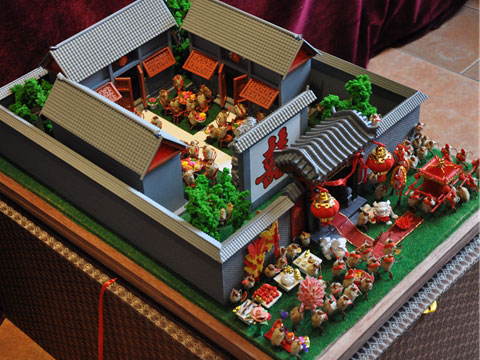
A traditional Chinese wedding scene Photo: courtesy of Xiao Jing
|
|
||
 |
| Touched | Sympathetic | Bored | Angry | Amused | Sad | Happy | No comment |
Rhythm Media Group is a multi-media company, operating a US-based Chinese daily newspaper, The China Press, and the paper's website - uschinapress.com (which has mobile-app version), as well as a Beijing-based English website Sino-US.com. The group boasts 15 branch offices across the US, and a number of cultural centers focusing on culture-related business in the North America, Chinese mainland, Hong Kong and Taiwan.Launched in September 2012, the Sino-US.com is designed to serve as a bridge between China and the US, and to keep its readership inside or outside China better informed by providing news and insights on China's current affairs, culture, life, business, people and sports.
|
|